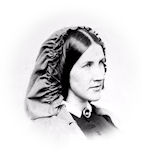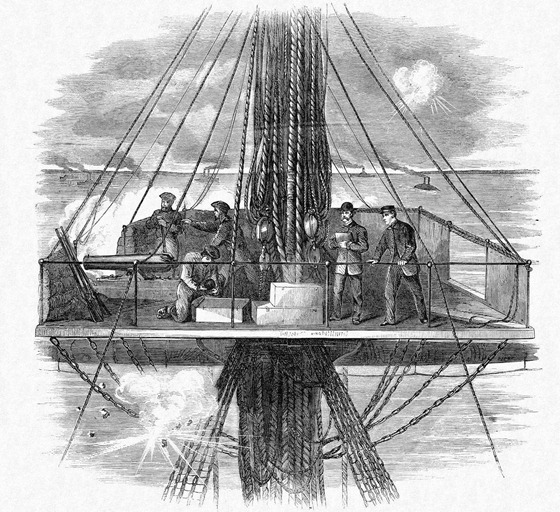Written from the Sea islands of South Carolina.
Sunday, May 4, 1862.
[Diary]
My thirty-seventh birthday yesterday. Never thought I would spend it in South Carolina, on a plantation too, and there by right as occupant.
It was beautiful this morning at church. The live-oaks were more mossy and gray than ever and the spot more lovely. The crowd was greater, and the dresses cleaner and more picturesque too. The man with the carpet poncho did not have it on to-day, probably as it was so warm. But the turbans were grand. Mr. Horton conducted the services finely, with plenty of old-fashioned doctrine, to be sure, but with good sense, especially when he told them how much greater men are than the beasts of the field. One old negro made a fine prayer after the service, just what it should be, in which he prayed that God would guide and bless the good folks who had come down to help them. He did not dare to mention General Hunter’s call for black soldiers, and all the superintendents fear it will not be responded to. Will Capers has enlisted, however, and others talk of it. Will is a fine fellow in every respect.
After church, groups formed outside. It was a beautiful scene. The church overflowed; there were over three hundred inside and many out — seven hundred and thirty-eight in all, Mr. Horton says. The children behaved well and I think the Sunday School was a success. I talked of Christ’s love for children and how He would take them to Heaven if they were kind to each other. I had between twenty and thirty in my class. I also taught them their letters and a card of words. There were several black teachers. After church the superintendents gathered around and had a little talk. Then ration bread was taken in the carriage with us arid distributed after church. That is the time for getting letters, too, for those poor, out-of-the-way fellows on some plantations.
It was amusing to see the vehicles by which some of the gentlemen came. Mr. Philbrick rode on a skin-and-bone horse with rope for bridle, and a side saddle. Mrs. Philbrick accompanied him in a sulky, holding the ropes and an umbrella, while the little negro clung on the “tree” between the wheels with the whip and used it when directed by Mrs. P. Behind was tied a square box for bread. As we left the church, the long line of negroes going slowly home was very pretty. Some of them carried shoes to church in their hands and kept them so, to show they owned a pair, I suppose. Decidedly they were more cleanly and better clothed to-day than before, and happier too. Paying them even a little has reassured them. They are very eager to believe we are their friends, but have had some things to make them doubt. At the paying-off on this plantation the other night they seemed all thankful, though some objected to the bank bills. Mr. Pierce was very sorry they had not specie to give them. It was a strange looking spectacle, all those black faces peering in at door and window, for they assembled on the front porch and answered when Mr. Pierce called their names. Mr. Hooper had the money and handed it over to Mr. Pierce, who gave it to each. The earnings were from seventy-five cents to three dollars each. Cotton only is paid for, not corn. Each man took his money with a scrape backwards of his foot, each woman with a curtsey. Rina says that they never had anything but ground for floors to their cabins, and they had no lofts. But after massa left, they took his boards, floored their own cabins and put in lofts. This does not seem as if they preferred to live in their present style.
Mr. Boutwell, of the Coast Survey, was here to-day. He says the St. Helena people were hard, and not considered well educated or good specimens of planters. Certainly they were hard to their negroes, especially on this place. It was being prepared for Mr. Fuller’s residence when the flight occurred.
Yesterday Mrs. French, Mrs. Nicholson, and Miss Curtis were here with Lieutenant Gregory and Lieutenant Belcher, of the Michigan regiment. They have some special care of the ladies at Mr. French’s. Lieutenant Gregory said we have but 4000 soldiers here; 15,000 in all Port Royal; and the enemy are concentrating around us. They have already 20,000 surrounding us and may take it into their heads to rout us. Their approach would be in three directions, one through this island.
We have heard to-day that there is a mail to Beaufort, a late one, the earlier having been detained at Hampton Roads — why, we know not. It is over three weeks since a mail came in. I expect Ellen to-night. I have often expected her before; but to-night she must come, and Mr. Hooper has gone for her and the letters.
I heard a story of a negro the other day who was saying all manner of hard things of the old masters and his own in particular. “Well,” said an officer, standing by, “we have caught him and now what shall we do with him?” “Hang him, hang him — hanging is too good for him,” cried the negro, in great excitement. “Well,” said the officer, “he shall be hung, boy, and since he injured you so much, you shall have a chance now to pay him back. You shall hang him yourself, and we’ll protect you and see it done.” “Oh, no, can’t do it — can’t do it — can’t see massa suffer. Don’t want to see him suffer.” . . .
One of the most touching of all songs I have heard is that “croon” in a minor key —
“Poor Rome — poor gal —
(is to)
Heaven (will) be my home.”
I never heard anything so sad. I will get the words and tune some day.
My housekeeping experiences are very funny. No milk — and breakfast. I send Lucy to send Aleck to find Robert and bring the milk. Aleck comes back, saying, “Can’t get no milk, ma’am. Calf run away. Cow won’t give milk if the calf don’t suck, ma’am.” Two hours or so after, milk comes. The cow will give no milk except while the calf is having its supper, and so it is a race between old Robert and the calf to see which will get the most or enough.
There are sometimes six negroes in the dining-room at once during meal-times — the other day Aleck making his appearance with two huge fish, which he held up triumphantly, raw and fresh from the water. On the other hand, often at meal-times not a negro can be found; the table is not set, for Lucy has gone; the fire cannot be kindled, for there is no wood and Aleck has gone; the milk has not come, etc., etc.
A sad thing here is the treatment of animals. The other day one of the oxen came home almost flayed, with great skinless welts, and a piece of skin (and flesh, too, I think), taken out over the tail. This afternoon Miss Winsor and I stopped Joe, who had taken Mr. Whiting’s little colt and harnessed him without any permission. Then he drove him at a gallop, with negroes hanging on, through the deep sand, so that he came home all of a tremble. All the gentlemen being gone, and nearly all the ladies, they thought they could do as they pleased; but Miss Winsor, with admirable tact and authority, made Joe dismount, unharness, and care for the horse after his return from a first trip. The dogs are all starved, and the horses are too wretched.
Last night we heard the negroes singing till daylight. Rina said they thought as they had Sunday to rest they would keep up their meeting all night. It was a religious meeting.
Mr. Hooper has returned with letters — none from home for me; one from Sophie, fortunately. The other two were with supplies from Philadelphia — $2000 worth to be distributed by me. They speak of having read my letters to committees, etc., and that frightens me.
New Orleans is ours — has capitulated. Mr. Hooper, Mr. Ruggles, and Mr. Horton, the Baptist minister, were sitting in the parlor this Sunday afternoon. Suddenly we heard three lusty cheers. I ran in, little bird in hand, and heard the joyful announcement of this news.
Miss W. has been sick and I have taught her school. Did very well, but once heard a slash and found Betty with a long switch whipping two of the girls. I soon stopped that and told them I had come here to stop whipping, not to inflict it. Aleck, that “limb,” stopped in front of the desk and harangued me in orator style to prove that Betty was authorized by Miss Nelly. Mr. Severance drove me there and back, with a rabble of negroes hanging on behind. We rode to church to-day with nearly half a dozen somewhere about the carriage.
Lieutenant Belcher, who was Provost Marshal of Port Royal, is a stanch homoeopathist, and we have promised to doctor each other should occasion require. I have a great many patients on hand —”Too many,” as the negroes say.
 Georgeanna to Mother.
Georgeanna to Mother.









